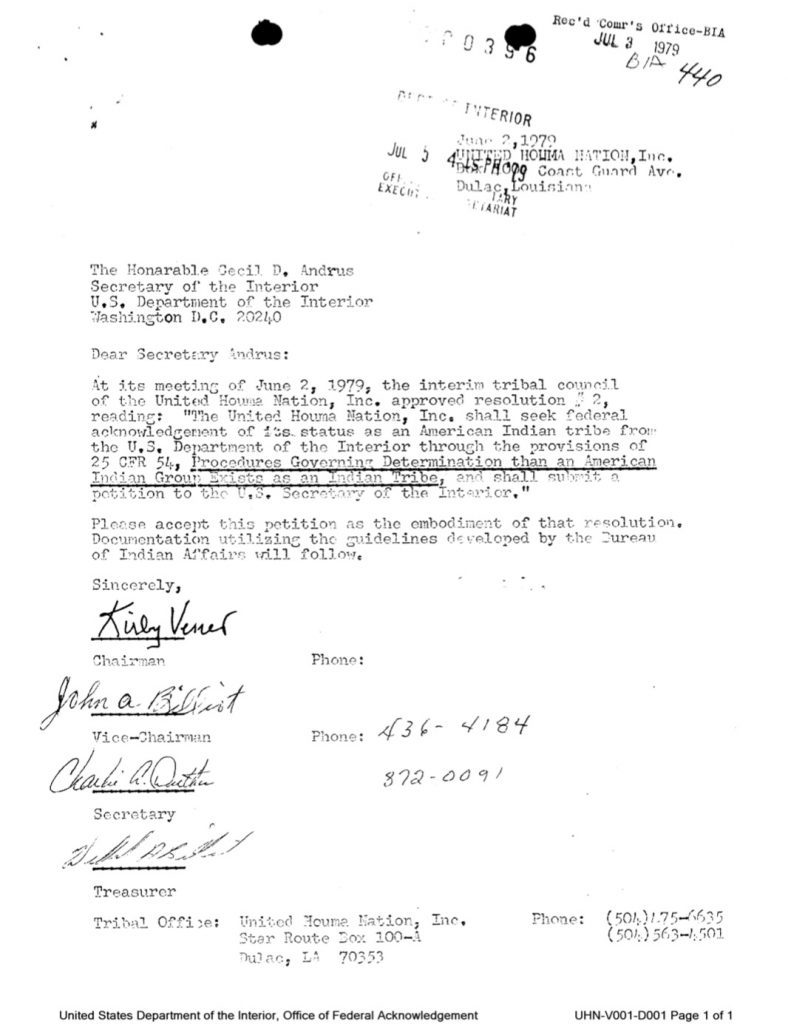By Jade Williams, features editor
The United Houma Nation is a tribe with over 19,000 members who have been recognized by the state of Louisiana, but have been fighting for years to get federal recognition.
“We’ve been fighting for federal recognition for over 40 years. I don’t exactly know how long it could take, but we will continue fighting, so they see who we really are,” Chief of United Houma Nation August Creppel says.
Creppel says the United Houma Nation was recognized as a local tribe when Governor Edwin Edwards was in office in the 90s.
According to a journal titled The Houma Nation: A Historiographical Overview, the Houma like many other tribes have applied for federal recognition through oral and written documents.
It states that in December of 1994, the Bureau of Indian Affairs (BIA) published through its Branch of Acknowledgement and Recognition (BAR) a “proposed finding against federal acknowledgment” the United Houma Nation filed a lawsuit challenging the proposed judgement and questioning the BIA’s standards.
The tribe to this day is still fighting for that recognition.
With this, Creppel says as a tribe, there are certain criterias one has to meet to become federally recognized. He says the criteria used to be that they had to prove they were related to the Houma tribe back in the seventeen and eighteen hundreds.
Now, he says the criteria is to be established as a tribe since the nineteen hundreds. Creppel says today they have a way better chance of getting that recognition.
“I appointed a committee to a federal recognition task force and we are moving forward on our federal recognition and it seems like… the way I feel and the way some of our elders feel right now is our time for recognition that we are going to have the best chance ever,” Creppel says.
Joshua Pitre, who grew up in south Louisiana and now works in Washington D.C. in a law firm that represents Native American tribes across the country says it was in the year he was born, which was in 1979, when they first found the letter of intent through the federal administrative process of getting federally recognized.
One of the tribes that Pitre represents at his law firm is the United Houma Nation.
“Growing up I always knew that I wanted to help my people and our recognition efforts and just overall you know just efforts to provide some services to our tribal members, but I never knew how we would get there. I feel really blessed to be in this position where I work for my tribe. So, It’s really a dream,” Pitre says.
Right now, the tribe can only apply for state grants and private donations. Once they are recognized, they can apply for federal grants and programs like health programs for the elders.
“That’s the main thing is taking care of our elders. I always say they are not our past, they are our culture. They are the ones who got us to where we are today,” Creppel says.
He says having federal recognition could improve schools and education systems as well.
“To see the look on their faces and to be federally recognized so they can feel that they are who they have always been and the trouble and things they went through because they had a hard life,” Creppel says.

